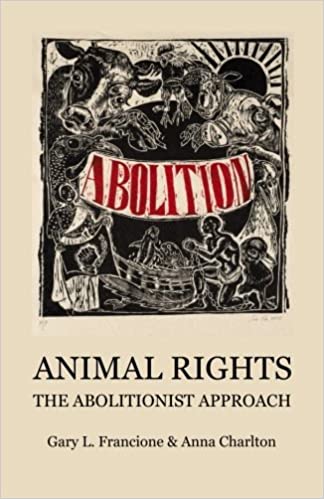Review by Erin Lanza, student at BPP University

Gary Francione, the controversial legal scholar, author, and professor of animal rights, begins this book with a promise: ‘This book is about a revolution––a revolution of the heart’. A promoter of creative, nonviolent vegan education for more than 30 years, Francione argues for a stance on animal rights that invokes a necessary paradigm shift in human perception of nonhuman animals. In this 2015 book, co-written with Anna Charlton, his ideals and positions are explained in detail. Rather than engage in welfare-driven calls for “compassionate consumption”, which he states implicitly accept the exploitation of animals for human pleasure and ultimately perpetuate these systems of abuse, Francione’s message is that we should not be using animals at all.
In Animal Rights: The Abolitionist Approach, the authors explore the moral reasoning behind this stance while articulating six main principles of the Abolitionist approach. The first principle asserts that all sentient beings, human or nonhuman, have the basic right not to be treated as property. As Francione explains, being sentient, or possessing the evolutionarily acquired trait of subjective awareness, necessitates having interests, desires, and preferences. This shared trait is consistent within members of the moral community, and it mandates our universal condemnation of systems such as human slavery.
As a consequence of the existing speciesist paradigm, however, nonhuman animals continue to exist within a legal framework of being property. In other words, they have no moral value, and we are thus allowed and encouraged to use nonhuman animals exclusively as human resources. The Abolitionist Approach wholeheartedly rejects this norm and considers it morally unjustifiable.
As a necessity of Principle One – the right not to exist solely as one’s property – Abolitionists must reject all institutionalised systems of animal exploitation. This means that Abolitionists do not support welfare reform campaigns or single-issue campaigns (SICs), a principle that poses a clear obstacle for many animal justice campaigners, lawyers, and policymakers who have found successes along this path. This particular principle distinguishes Francione’s position from many animal rights advocates, causing controversy while allowing for an undeniable degree of consistency and commitment.
Citing decades of research, Francione describes how welfarist groups target ‘low-hanging fruit’ for reform projects, which serve almost exclusively to make animal exploitation more efficient and cost effective. These projects fail to address the immorality of animal use; rather, by virtue of their existence, they imply that certain types of animal use are morally acceptable. SICs similarly confuse the problem: By advocating for e.g. larger cages, they express an implicit acceptance of cages and promote the idea that nonhuman animals can be exploited and killed “compassionately”.
To prevent any confusion in his own message, Francione makes clear the fact that veganism is a moral baseline – the third principle of his Abolitionist Approach. The clarity of this stance supports the moral cohesion of total rejection of animal use, and provides further contrast with the welfarist incremental approach to animal rights.
As Francione asserts, ‘reform would not have eradicated slavery’, arguing that few would advocate for “baby steps” in the elimination of systems which render human beings into mere things. To advocate for an incremental approach to animal rights, then, is not only ineffective and immoral, but specifically speciesist.
His fourth principle states that ‘all sentient beings are equal for the purpose of not being used exclusively as a resource’ and rejects the relevance of any other cognitive characteristic. To demonstrate the speciesist thoughts that humans have about nonhuman animals, Francione asks us to consider how we place certain animals over others. Those that display similar capacities for mental tasks that humans deem ‘intelligent’ are favoured as superior and consequently less fit for our exploitation or consumption. His point is that regardless of cognitive capacities or characteristics, however, all sentient beings are equal in their right not to be used as a resource, a sentiment that is easily understood when applied to inter-human relations. Just as one would reject as morally abhorrent the idea that a baby or someone with amnesia or dementia would be a more fit object of a nonconsenting biomedical experiment than someone who exercises their full mental capacity, so he argues we must we reject the use of any nonhuman animals as a resource – regardless of their perceived cognitive capacity.
Abolitionists, as described in this book, thus require a morally cohesive analysis and assignation of rights, a standard that leads to principle five: the rejection of ‘all forms of human discrimination, including racism, sexism, heterosexism, ageism, ableism, and classism’, just as they reject speciesism. The recognition of this principle in theory would preclude the use of discriminatory or objectifying practices in the advocacy of animal rights. Francione argues that such practices are commonplace in many welfarist campaigns, e.g. how fur campaigns (which fail to address the moral indistinguishability of fur from wool, leather, and silk) disproportionately attack women – as moral failures. Not only do Abolitionists reject entirely these discriminatory campaigns, they recognise the sixth principle of nonviolence as central to the animal rights movement.
Francione’s Abolitionist Approach is dismissed by many animal advocates, especially those who work in the welfare sector, as ‘extreme’. Whether or not one agrees with his movement, his strong viewpoints are made clear and persuasive in this book, and they add to the sphere of animal rights activism. This book outlines his positions incredibly well.


















